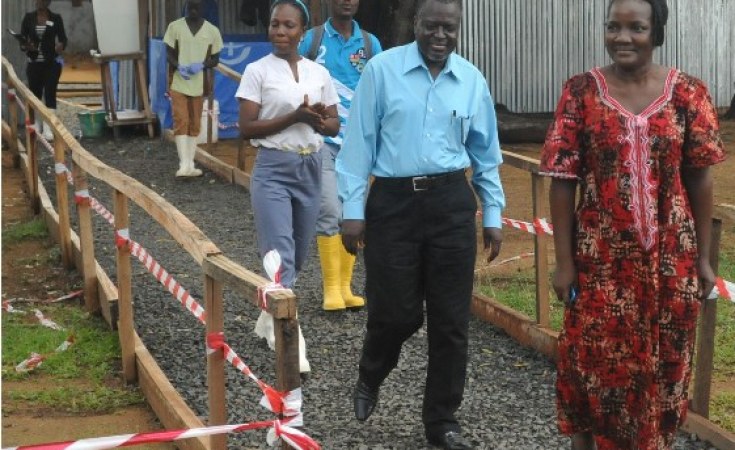Washington, DC — The Ebola crisis in west Africa is " a national security priority" for the United States, President Obama said in an interview on Saturday.
Two months ago, the American president said, he told his national security team that "we have to make this a national security priority" and that the United States must mobilize the international community to get resources to the region.
"U.S. military assets" are needed, he told Chuck Todd from the U.S. television network NBC, to compensate for the shortage of local public health workers and to support "a surge of public health workers and equipment and to set up isolation units. African governments "are making some significant progress," Obama said, adding that Americans shouldn't be concerned that "about the prospects of contagion here," in the short-term. But he said a failure to contain Ebola now could result in the virus becoming "more easily transmittable" and, as a result, "a serious danger to the United States."
That is an argument, he said, when he goes to Congress and says, "Let's give some public health aid to countries like Liberia, so that they can set up hospitals and nurses and vaccinations, et cetera," .
The full transcript of the Ebola section of the interview broadcast by NBC's Meet the Press
CHUCK TODD: Ebola, there's some anxiety in the country about it. Obviously, it's something that Africa's trying to get its hands around. But there is obviously anxiety in the United States. How concerned are you? And how concerned should Americans be?
PRESIDENT OBAMA: Well, Americans shouldn't be concerned about the prospects of contagion here in the United States, short term. Because this is not an airborne disease.
CHUCK TODD: I noticed you said short term, though.
PRESIDENT OBAMA: Well, I'm going to get to that. It's not an airborne disease, like the flu. You can only catch it through the transmission of bodily fluids where you have a strong public health infrastructure. Now, typically, there's one person who's identified, or a couple of people who are identified as having the virus. Isolate them. Run through a real tight protocol. And it-- it gets contained-- pretty effectively. The problem that we've got is in, right now, a limited portion of western Africa, primarily Li-- especially in Liberia but also Sierra Leone, Guinea-- (OVERTALK)
CHUCK TODD: A part of Africa that economically had been booming.
PRESIDENT OBAMA: Yeah. They-- they-- they--
CHUCK TODD: And all of a sudden, I mean, this is--
PRESIDENT OBAMA: They're-- they're-- they're making some significant progress. But they-- they didn't have a public health infrastructure. So now what we have is what should be a containable problem breaking loose because people aren't being quarantined properly. People aren't being trained properly. People aren't being trained properly. There aren't enough public health workers. So what I've said, and I said this two months ago to our National Security Team, is we have to make this a national security priority. We have to mobilize the international community, get resources in there. We're going to have to use--
CHUCK TODD: It's going to be a U.S. effort--
PRESIDENT OBAMA: As usual. And we're going to have to get U.S. military assets just to set up, for example isola-- isolation units and-- and equipment there, to provide security for public health workers surging from around the world. If we do that, then it's still going to be months before this problem is controllable in Africa. But it shouldn't reach our shores.
Now, here's the last point I'm going to make. If we don't make that effort now, and this spreads not just through Africa but other parts of the world, there's the prospect then that the virus mutates. It becomes more easily transmittable. And then it could be a serious danger to the United States. This is an example of where U.S. leadership is important in dealing with crisis. But it's also an argument for why when-- when I go before Congress, and I say, "Let's give some public health aid to countries like Liberia, so that they can set up hospitals and nurses and vaccinations, et cetera," you know, sometimes, you know, the American public says, "Why are we wasting money on them?" Well, part of it is because, you know, when-- when we make those short-term investments now, it really pays of a lotta dividends in the future.


